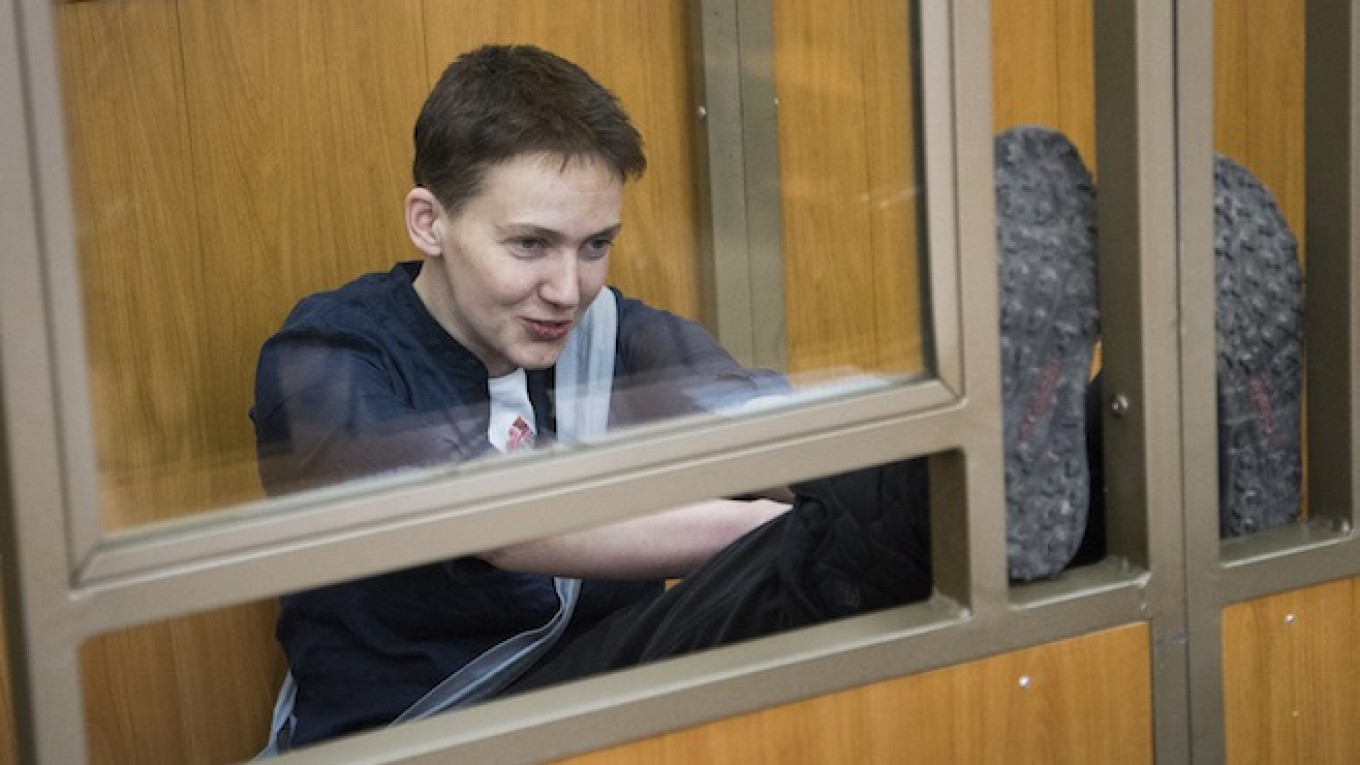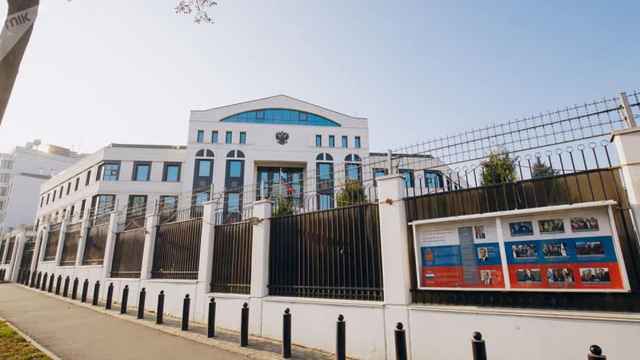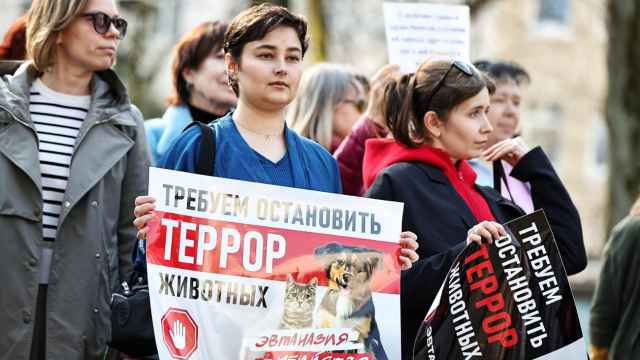President Vladimir Putin might like to trade convicted Ukrainian pilot Nadezhda Savchenko for Russian nationals imprisoned in the United States, but such an exchange is not being considered by the White House.
The fact that the Kremlin is negotiating the exchange of Savchenko for two Russian nationals currently held in U.S. prisons was voiced by Interfax's source Tuesday. The report was immediately denied by U.S. officials in Moscow and Kiev.
Spokesman for the U.S. Embassy in Moscow Will Stevens told the RBC news website on Tuesday that Washington was not even considering the exchange of Savchenko for Russian nationals imprisoned in the United States.
U.S. Ambassador to Ukraine Jeffrey Payette called the offer “ridiculous,” the RIA Novosti news agency reported.
The United States insists that Savchenko has been convicted illegally and should be released without any conditions — according to Minsk agreements.
The Kremlin's maneuver to trade Savchenko was serious, foreign policy expert Vladimir Frolov told The Moscow Times on Tuesday. Russian Foreign Minister Sergei Lavrov brought up the Kremlin's interest in releasing Russian nationals from the United States during U.S. Secretary of State John Kerry’s visit to Moscow last week.
“Kerry said Yaroshenko was convicted of involvement in drug trafficking. Neither Yaroshenko, nor Bout was engaged in such business, therefore, we are convinced that the sentences were absolutely disproportionate,” Lavrov said at a press conference last Thursday, following talks between Russia and the United States.
Presidential spokesman Dmitry Peskov confirmed that the imprisonment of Bout and Yaroshenko was discussed during the Putin-Kerry meeting. Peskov added that the Kremlin considers their detention illegal, but denied that Russia was lobbying for an exchange.
Kerry, who traveled to Moscow primarily to discuss the situation in Ukraine and Syria, expressed hope that Savchenko — who was recently sentenced to 22 years by a Russian court — could soon be returned to Ukraine.
The Kremlin was acting in accordance with the Soviet custom of trading dissidents for spies and alike, Frolov said. This move has also demonstrated that Moscow believes that all issues regarding Ukraine must be discussed between Russia and the United States.
“Savchenko, in this case, is the pawn of a non-existent country while the real dialogue takes place between Russia and the United States,” Vladimir Frolov told The Moscow Times.
“Russia sees Ukraine as a proxy state ruled by puppet masters from Washington — the logic is to negotiate with them and not their puppets,” said Yekaterina Schulmann, a political scientist and associate professor at the Russian Presidential Academy of National Economy and Public Administration.
The signs pointing to Moscow's readiness to exchange Savchenko for Bout and Yaroshenko were given long before Savchenko's conviction.
In March 2015, the Russian ambassador to the UN, Vitaly Churkin, said at a meeting of the UN Security Council that the United States had a “habit” of “stealing Russian citizens throughout the world and charging them with manufactured charges as a result of provocation by the U.S. intelligence agencies.”
It was not difficult to guess which Russian nationals he meant, journalist Sergei Parkhomenko said.
The arms dealer Viktor Bout was arrested in 2008 in Bangkok and then extradited to New York, where in 2011 he was sentenced to 25 years in prison for the selling of arms to terrorist organizations. Russian pilot Yaroshenko was sentenced by a U.S. court to 20 years in prison for drug trafficking.
After Savchenko's conviction, Ukrainian President Petro Poroshenko suggested that Putin trade the Ukrainian pilot for former servicemen in the Russian military Alexander Alexandrov and Yevgeny Yerofeyev, — captured and currently held in Ukraine. However, the Kremlin has shown little interest in such a deal.
Bout and Yaroshenko appear to be more valuable to the Kremlin.
Parkhomenko says that Bout may have information that the Kremlin does not want revealed. “No doubt, Bout could not sell weapons on such a scale on his own — he had accomplices. And if he becomes desperate about imprisonment in the United States, he can start talking,” he added.
Frolov says the reason behind Moscow's move is not Bout himself — it is a matter of principle. The Kremlin wants to show that the United States has no right to extradite Russian citizens and put them on trial, he said, — this is Moscow's way of getting even.
Meanwhile, Savchenko's lawyer Ilya Novikov noted that the exchange of the Ukrainian pilot for Yaroshenko and Bout would be the fastest way for her to be released.
However, when Moscow realizes that it cannot use Savchenko to extract anything from the United States, it will have to find another way to trade Savchenko — in exchange for Russian citizens convicted in Ukraine, Novikov said.
Contact the author at a.bazenkova@imedia.ru
A Message from The Moscow Times:
Dear readers,
We are facing unprecedented challenges. Russia's Prosecutor General's Office has designated The Moscow Times as an "undesirable" organization, criminalizing our work and putting our staff at risk of prosecution. This follows our earlier unjust labeling as a "foreign agent."
These actions are direct attempts to silence independent journalism in Russia. The authorities claim our work "discredits the decisions of the Russian leadership." We see things differently: we strive to provide accurate, unbiased reporting on Russia.
We, the journalists of The Moscow Times, refuse to be silenced. But to continue our work, we need your help.
Your support, no matter how small, makes a world of difference. If you can, please support us monthly starting from just $2. It's quick to set up, and every contribution makes a significant impact.
By supporting The Moscow Times, you're defending open, independent journalism in the face of repression. Thank you for standing with us.
Remind me later.






